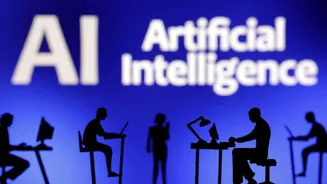You’re not the only one.
While many are beating the drum of the benefits of AI, a select few remain adamantly against it. It sounds unbelievable, but many in today’s world are choosing simply not to use AI at all. These people are known as AI vegans – and their belief system is known as AI veganism.
But what do we know about them? Why are they so against AI?
Let’s take a closer look
What do we know about them?
Much like vegans avoid dairy and animal products, AI vegans eschew AI tools and systems. While some may scoff at the comparison between the two, others argue that this is apt.
While vegans comprise around four per cent of the US population, there is no way to determine how many AI vegans there are in the world
But the numbers could be higher than most people think given that many people are worried about AI.
A 2023 Pew Research poll showed 52 per cent of Americans said they were concerned rather than excited by the increasing use of AI in everyday life. A 2024 Pew study showed that a fourth of K-12 teachers in the US thought AI was doing more harm than good.
But why would one become an AI vegan?
There are many reasons.

There are many reasons someone would become an AI vegan. These include ethics, concern for the environment, AI's impact on society and cognitive thinking in humans
The first reason is purely ethical. Many AI systems have been trained on copyrighted works. The AI companies trained their systems by feeding in works from authors – who have promptly sued the companies. Some people feel uncomfortable using AI on these grounds.
Others are worried about the impact of society if AI were to replace human workers. McKinsey Global Institute has predicted that AI could put 400 to 800 million workers around the world out of work by 2030.
Many of these people will likely be low-income workers. What happens if this comes to pass and millions of people are suddenly put out of work? How would society function? What would that look like?
The use of electricity and water – a precious resource in today’s world – that goes into cooling AI data centres has proved to be a breaking point for many. A city in Texas recently advised its residents to take fewer showers and use water sparingly. Meanwhile, massive data centres across the same city have guzzled hundreds of millions of litres of water over the past few years.
As Robert Mace, executive director of The Meadows Center for Water and the Environment at Texas State University told
“Once that water evaporates, it’s just gone”, Mace added.
Others have cited studies that say the use of AI negatively impacts cognitive skills in human beings.
The way ahead
Much remains unknown about AI including its long-term impacts on humanity. But there already troubling signs.
For example, a Harvard study from May found that generative AI, while increasing the productivity of workers, diminished their motivation and increased their levels of boredom.
A Microsoft Research study found that people who were more confident in using generative AI showed diminished critical thinking. A Cambridge University survey from this year showed that some students were simply avoiding AI altogether. Their worry? The use of AI would making them lazy.
Few would argue we are in a brave new world. And no one seems to have the answer right now.















